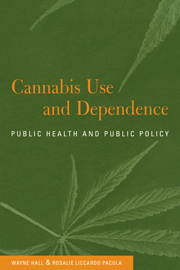Book contents
- Frontmatter
- Dedication
- Contents
- List of figures and tables
- Foreword
- Acknowledgements
- 1 Introduction
- Section 1 Cannabis the drug and how it is used
- 2 Cannabis the drug
- 3 Patterns of use
- Section 2 The health effects of cannabis
- Section 3 The psychological effects of chronic cannabis use
- Section 4 Effects on adolescent development
- Section 5 Harms and benefits of cannabis use
- Section 6 The effectiveness and costs of cannabis prohibition
- Section 7 Policy alternatives
- Appendix 1
- Appendix 2
- References
- Index
3 - Patterns of use
from Section 1 - Cannabis the drug and how it is used
Published online by Cambridge University Press: 05 July 2016
- Frontmatter
- Dedication
- Contents
- List of figures and tables
- Foreword
- Acknowledgements
- 1 Introduction
- Section 1 Cannabis the drug and how it is used
- 2 Cannabis the drug
- 3 Patterns of use
- Section 2 The health effects of cannabis
- Section 3 The psychological effects of chronic cannabis use
- Section 4 Effects on adolescent development
- Section 5 Harms and benefits of cannabis use
- Section 6 The effectiveness and costs of cannabis prohibition
- Section 7 Policy alternatives
- Appendix 1
- Appendix 2
- References
- Index
Summary
Measuring cannabis use
Information about cannabis use is collected by surveying representative samples of the general population about their use of the drug. These surveys typically ask whether the person has used cannabis: at any time in their lives (lifetime use), in the past year (past year use), and in the past month (recent use). Given the low rates of weekly and daily cannabis use in most surveys, lifetime use and use in the past year are most often reported.
The validity of self-reported cannabis use is well-supported in carefully designed surveys. O'Malley, Bachman and Johnston (1983), for example, showed that self-reported drug use in three waves of interviews of high school seniors was as reliable as other self-reported behaviour. Although some older adults underreport their drug use during adolescence and early adult life, under-reporting of cannabis use is quite low (Johnston et al., 1994a; Johnston et al., 1994b). Most importantly, whatever biases there may be in self-reported cannabis use are fairly constant over time, meaning that we can be reasonably confident about estimates of trends in drug use (Johnston et al., 2001).
Cannabis use in the United States
The best information on cannabis use has been collected in the United States where two major surveys of illicit drug use have been conducted since the early 1970s. The 'Monitoring the Future’ project has surveyed nation-wide samples of high school seniors, college students and young adults annually since 1975 (Johnston et al., 1994a; Johnston et al., 1994b). The National Household Survey on Drug Abuse (sponsored by the National Institute on Drug Abuse) has surveyed household samples of person over the age of 12 years throughout the US since 1972.
NIDA Household Survey
NIDA has surveyed approximately 9000 persons aged 12 years and older in randomly selected households throughout the US every two to three years since 1972. Since 1991 it has been conducted annually on 30,000 participants (National Institute on Drug Abuse, 1992).
- Type
- Chapter
- Information
- Cannabis Use and DependencePublic Health and Public Policy, pp. 18 - 30Publisher: Cambridge University PressPrint publication year: 2002



